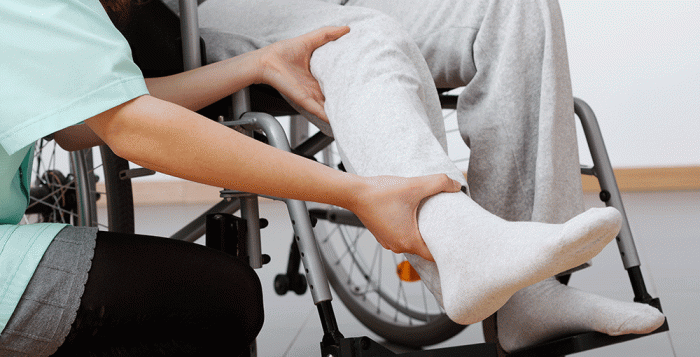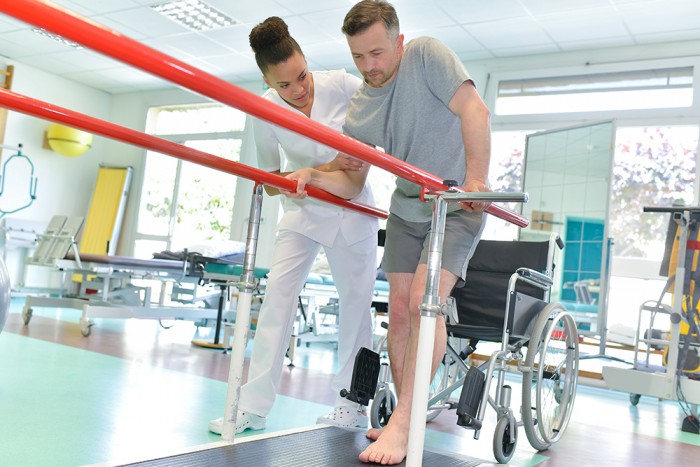The next Managed Long-Term Services and Supports (MLTSS) Subcommittee will convene on Wednesday, March 4, 2020 from 10:00 am – 1:00 pm at the Pennsylvania Department of Education Honors Suite, 1st floor, 333 Market Street Tower, Harrisburg, PA 17126. If you are unable to attend in person, the option to participate via teleconference is also an option. The conference line number is: 562-247-8422; PIN: 490-838-184. The agenda for this meeting is here.
House of Reps Letter to CMS on Proposed Cut to Therapy Services
On February 5, 2020, ninety-nine members of the House of Representatives signed and sent a letter to Seema Verma, Administrator, Centers for Medicare and Medicaid Services (CMS), that questions the proposed eight percent cut to therapy services. The proposed cut was included in the calendar year (CY) 2020 Medicare Physician Fee Schedule (MPFS) final rule that was published on November 15, 2019. The letter contained two questions asked of CMS, including the methodology and data that were used in this decision making. The responses to these questions were requested by February 21, 2020. Contact RCPA Rehabilitation Services Division Director Melissa Dehoff with questions.
CMS Finalizes Decision to Cover Acupuncture for Chronic Low Back Pain
After conducting many reviews and examining the coverage policies of private payers, the Centers for Medicare and Medicaid Services (CMS) finalized a decision to cover acupuncture for Medicare patients that suffer from chronic low back pain. The increased reliance on opioids and the current opioid public health crisis were large contributors to this decision. Studies have shown that patients who have suffered from chronic low back pain, and were treated by acupuncture, showed significant improvements in both function and pain. Hence, a better alternative than prescription opioids. This expansion of options for pain treatment is a large piece of the Trump Administrations’ strategy for defeating the country’s opioid crisis.
Acupuncture is a treatment performed by practitioners who stimulate specific points on the body by inserting small thin needles through the skin. For the purpose of this decision, chronic low back pain is defined as:
- Lasting 12 weeks or longer;
- Nonspecific, in that it has no identifiable systemic cause (i.e., not associated with metastatic, inflammatory, infectious, etc. disease);
- Not associated with surgery; and
- Not associated with pregnancy.
Medicare will cover up to 12 sessions in 90 days, with an additional 8 sessions for those patients with chronic low back pain who demonstrate improvement. No more than 20 acupuncture treatments may be administered annually. Treatment must be discontinued if the patient is not improving or is regressing.
Feedback Requested on Pre-Rehabilitation & Rehabilitation for Joint Replacement Surgery
Due to the increase in joint replacement surgeries and the prediction for these surgeries to become more prevalent by 2025, along with the implementation of the Bundled Payments for Care Improvement (BPCI) initiative, a request has been made by the Agency for Healthcare Research and Quality (AHRQ) for feedback on Pre-rehabilitation and Rehabilitation for joint replacement surgery. AHRQ is specifically seeking this information because decision makers are unclear about which pre-rehabilitation (e.g., resistance and proprioceptive training) and rehabilitation interventions (e.g., rehabilitation hospitalization, home physical therapy, or outpatient physical therapy) provide the most optimal patient outcomes with the most efficient use of resources. There is also discussion over the settings where these interventions provide the most value. Because of this uncertainty, a new systemic review on the effects of pre-rehabilitation and rehabilitation for major joint replacement surgery may be warranted.
RCPA encourages members to provide feedback to the key questions. The deadline to provide feedback is Friday, January 17, 2020.
CMS Seeks Additional Feedback on Scope of Practice Laws
The Centers for Medicare and Medicaid Services (CMS) is seeking additional feedback and recommendations regarding the elimination of specific Medicare regulations that require more stringent supervision than existing state scope of practice laws, or that limit health professionals from practicing at the top of their license.
This request from CMS stems from President Trump’s Executive Order (EO) #13890: Protecting and Improving Medicare for our Nation’s Seniors, which directs the Department of Health and Human Services (HHS) to propose a number of reforms to the Medicare program. These reforms include those that eliminate supervision and licensure requirements of the Medicare program that are more stringent than other applicable federal or state laws and often limit health care professionals, such as Physician Assistants (PAs) and Advanced Practice Registered Nurses (APRN) from practicing at the top of their professional license.
CMS did incorporate some of the recommendations previously submitted in several payment rules, including the calendar year (CY) 2020 Medicare Physician Fee Schedule (MPFS), where one of the changes included redefining physician supervision for services furnished by Physician Assistants (PAs).
If members have additional recommendations on ways to reduce unnecessary burden, increase efficiencies, and improve the beneficiary experience, please send them to this email with “Scope of Practice” in the subject line. Recommendations must be submitted by January 17, 2020.
CHC Third Thursday Webinar Scheduled for January 16
The next Community HealthChoices (CHC) Third Thursday webinar has been scheduled for January 16, 2020 from 1:30 pm – 3:00 pm. During this webinar, Office of Long-Term Living’s (OLTL’s) Deputy Secretary Kevin Hancock will provide updates on the CHC program. Providers should register to participate in the webinar. Once registered, a confirmation email will be sent and will include the call information. Questions about the webinar should be directed to OLTL’s Bureau of Policy Development and Communications Management at 717-857-3280.
CMS Releases IRF Provider Preview Reports
The Centers for Medicare and Medicaid Services (CMS) recently announced the availability of the inpatient rehabilitation facility (IRF) provider preview reports. These reports have been updated and contain information based on quality data submitted by IRFs between Quarter 3 of 2018 and Quarter 2 of 2019. The data will reflect what will be published on IRF Compare during the March 2020 update of the website.
Providers have 30 days (December 9, 2019 – January 9, 2020) to review their performance data. While corrections to the underlying data will not be permitted during this time, providers can request CMS to review their data during the preview period if they believe the quality measure scores that are displayed are inaccurate.
Additionally, providers are reminded that the data for the quality measure Percent of Residents or Patients that have new or worsened Pressure Ulcers (short stay), will continue to reflect data collected between Quarter 3 2017 – Quarter 2 2018, and will continue to be publicly displayed until the new Changes in Skin Integrity Post-Acute Care: Pressure Ulcer/Injury, is publicly displayed in fall 2020, as finalized in the fiscal year (FY) 2018 IRF PPS Final Rule.
As of the March 2020 refresh, CMS will no longer publicly display the measure Percent of Residents or Patients who were assessed and appropriately given the seasonal influenza vaccine (short stay), as finalized in the FY 2019 IRF PPS Final Rule. This change is reflected in preview reports. Contact RCPA Rehabilitation Services Director Melissa Dehoff with questions.
Council on Reform Public Comments Due December 16
As we approach the conclusion of the Governor’s Council on Reform public comment period on December 16, 2019, RCPA would like to ensure that each member has the materials for providing their public comments, feedback, and support. RCPA will be submitting commentary within each policy director’s purview, and we strongly urge your agency to submit your thoughts to the Council, including areas and issues that may not be represented in the current recommendations.
If you would like to send your submissions to your respective policy director for inclusion in the RCPA public comment, please have them submitted by close of business on Wednesday December 11, 2019.
Below you will find the links to important documents relating to the Council on Reform, including the Public Comment Submission Form. If you have further questions, please contact your respective RCPA Policy Director.
Thank you for your efforts and partnership to bring these recommendations to the forefront of your work.
Study Suggests Inpatient Rehabilitation Better for Stroke Recovery Than SNF
An article, “Comparison of Functional Status Improvements Among Patients with Stroke Receiving Postacute Care in Inpatient Rehabilitation vs Skilled Nursing Facilities,” was recently published in the Journal of the American Medical Association (JAMA) Network that highlights the findings from a cohort study of patients who received post-acute care in inpatient rehabilitation facilities (IRFs) or skilled nursing facilities (SNFs) following a stroke. The study examined changes in functional status. Stroke was selected because it is a major cause of disability in the United States and an important public health issue, and often requires a range of treatments and expertise.
The study included patients with stroke who were discharged from acute care hospitals to IRFs or SNFs from January 1, 2013 to November 30, 2014. Medicare claims were used to link to IRF and SNF assessments. The study does include limitations that were encountered, such as the findings don’t take into account other post-acute settings (home health, long-term care hospitals, etc.) and the inability to examine cognitive function before and after the stroke, stroke severity, or location of the stroke.
The findings of the study suggest that the care in an IRF was associated with greater improvement in mobility and self-care compared with care in an SNF. Their findings indicate the need to carefully manage discharge to post-acute care based on the patient’s needs and potential for recovery. Post-acute reform based on the Improving Medicare Post-Acute Care Transformation Act of 2014 (IMPACT Act) must avoid a payment system that shifts patients with stroke who could benefit from intensive inpatient rehabilitation to lower cost settings. The IMPACT Act of 2014 is a bill that is intended to change and improve Medicare’s post-acute care services and how they are reported. Contact RCPA Rehabilitation Services Director Melissa Dehoff with questions.

















